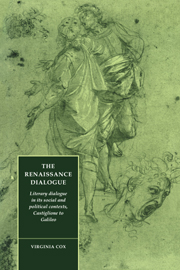 The Renaissance Dialogue
The Renaissance Dialogue Book contents
- Frontmatter
- Contents
- Preface
- 1 Problems of method
- 2 History and invention in the dialogue
- 3 The uses of the dialogue in sixteenth-century Italy: celebration and control
- 4 The uses of the dialogue in sixteenth-century Italy: commerce and courtesy
- 5 Castiglione's Cortegiano: the dialogue as a drama of doubt
- 6 The changing form of the Italian Renaissance dialogue
- 7 The theory and practice of the dialogue in Counter-Reformation Italy
- 8 From the ‘girevole strada’ to the straight and narrow path
- 9 From the open dialogue to the closed book
- Notes
- Bibliography
- Index
7 - The theory and practice of the dialogue in Counter-Reformation Italy
Published online by Cambridge University Press: 05 December 2011
- Frontmatter
- Contents
- Preface
- 1 Problems of method
- 2 History and invention in the dialogue
- 3 The uses of the dialogue in sixteenth-century Italy: celebration and control
- 4 The uses of the dialogue in sixteenth-century Italy: commerce and courtesy
- 5 Castiglione's Cortegiano: the dialogue as a drama of doubt
- 6 The changing form of the Italian Renaissance dialogue
- 7 The theory and practice of the dialogue in Counter-Reformation Italy
- 8 From the ‘girevole strada’ to the straight and narrow path
- 9 From the open dialogue to the closed book
- Notes
- Bibliography
- Index
Summary
… infinita sendo la turba delle bugie, le quali adombrano le scienzie, sempre da esse con ogni cura, come da peste contagiosa, si dee guardar lo 'ntelletto
Sperone Speroni, Apologia dei dialoghi, parte terza (1571)Among the works on the poetics of dialogue which began to emerge after 1560, the only one which departs from purely formal considerations, and makes a serious attempt to deal with the cultural politics of the genre, is Sperone Speroni's Apologia dei dialoghi (1574–5). The political focus of the Apologia was partly determined by the circumstances which led to its composition: the traumatic and ludicrous fact of Speroni's dialogues being denounced to the Inquisition, and the author's subsequent, justly indignant, endeavours to clear his name. Even the most superficial reading of the resulting work, however, should be enough to convince us that its apologetic format is little more than a pretext for a work which aspires to synthesize the reflections of a lifetime. At the same time one of the century's most distinguished writers of dialogue and one of its most incisive and original thinkers on the arts of discourse, Speroni was uniquely qualified to analyse the complex phenomenon of communication by dialogue. In the Apologia, combining a practitioner's sensitivity to poetics with a cultural historian's broad diachronic perspective, he provides the best guide we have to the religious and political factors which determined the trajectory of the dialogue in late-Cinquecento Italy.
- Type
- Chapter
- Information
- The Renaissance DialogueLiterary Dialogue in its Social and Political Contexts, Castiglione to Galileo, pp. 70 - 83Publisher: Cambridge University PressPrint publication year: 1992


